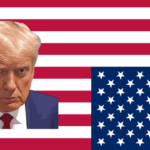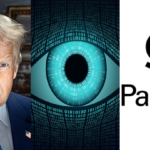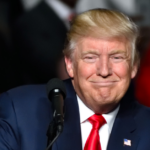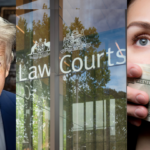US Supreme Court Consolidates Trump’s Power, Whilst Stymieing That of the Judiciary
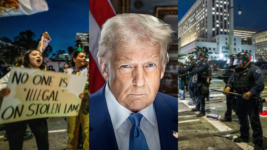
The US Supreme Court has ruled that federal court judges do not have the power to issue universal injunctions that block US presidential executive orders, which is a finding that not only consolidates the power of US president Donald Trump, but it also serves to heighten the power of the conservatively stacked Supreme Court, whilst diminishing the authority of the District Courts.
The case involved three District Court challenges to 20 January 2025-issued executive order 14160, which relates to birthright citizenship, as it seeks to establish that children born to parents who are undocumented migrants, do not automatically become US citizens. And each challenge involved a federal judge issuing a universal injunction, or a blanket nationwide ban on the aim of the order.
A majority of the court ruled to end the use of universal injunctions, with 6 justices for and 3 against. The six that ruled in favour were all appointed by Trump’s Republican Party, with three personally appointed by him. And with judicial power over the president now stymied, and his influence over US congress in the bag, the finding sees Trump further on the path to becoming a supreme ruler.
Since taking office on 20 January, Trump has unleashed a massive deportation operation, he’s issued a prohibition on foreign nationals from certain countries entering into the United States, and in response to demonstrations against deportation operations in Los Angeles in early June, he sent in the National Guard and the US Marines, and these soldiers continue to be deployed in LA.
The US president has declared the ruling “amazing”, as the District Courts, which hold the trials of the federal system in the US, can no longer block his orders. And Trump further considers this now opens avenues to progressing other controversial measures, such as penalising cities friendly to undocumented migrants, ending refugee resettlement and cut funding to transgender healthcare.
Conceding to authoritarian power
The US president can issue executive orders in the United States, which are directives in respect of the operations of the federal government. Since taking office in January, Trump has issued a barrage of sweeping executive orders, which have served to erode the rights of minorities that commenced being established in the 1950s, as well as serving to end 1930s social rights and the welfare state.
The 27 June ruling in Trump versus CASA saw the majority find that “universal injunctions likely exceed the equitable authority that congress has given to federal courts”. The justices failed to make any deliberations upon questions relating to birthright citizenship, although they may in the future. And the executive order itself will take effect in 30 days from the date the ruling was handed down.
The challenge to executive order 14160 is particularly controversial because many legal experts consider it unconstitutional, due to the fact that the Fourteenth Amendment of the US Constitution maintains that “all persons born or naturalised in the United States, and subject to the jurisdiction thereof, are citizens of the United States and of the state wherein they reside”.
Up until the 27 June Supreme Court ruling, Trump had been issuing executive orders, of which legal challenges were launched against in the courts, and if federal judges considered the content of an order might benefit from further judicial scrutiny in terms of its lawfulness, then they were placing temporary universal injunctions upon them, which served to halt the reforms ordered nationwide.
The result of the court ruling means that individuals seeking to challenge the outcome of an executive order on a personal basis can do so in court, while universal injunctions, which result in nationwide halts to the progression of an executive order, can still be issued by federal judges but only in terms of class actions, which are costly, time-consuming cases that aren’t easily mounted.
In the findings, Justice Amy Coney Barrett, a judge appointed by Trump, considered “the bottom line” was that “the universal injunction was conspicuously nonexistent for most of our nation’s history”, as the injunctions only came into play last century. Whilst Justice Ketanji Brown Jackson considered the ruling “an existential threat to the rule of law” in her dissenting opinion.
Domestic shock treatment
Trump has issued 164 executive orders since January. Former president Biden issued 162 over his entire term. The current president in his first term issued 220 such orders over four years. The difference between the orders of his first term and those being issued this year, is that most of his 2025 orders appear to be part of a planned great restructuring of US governance.
Many of the executive orders involve drastic changes to US society, such as a series of directives attempting to dismantle diversity, equity and inclusion programs, another only recognising two sexes, which is an attack on transgender and gender diverse peoples, along with multiple orders that have served to promote fossil fuel expansion and remove regulations that address planetary heating.
Trump commenced issuing these orders at a full throttle pace from the time of his inauguration, and whilst they’re attempting to consolidate his authoritarian power and provide favourable conditions for corporations and the ultrarich to continue destroying the planet for profit, they’re also serving as a form of society-wide shock treatment, which is immobilising a confused domestic population.
The current US president commenced utilising post-truth politics during his first term in office, but Trump didn’t possess the concentration of power that he established immediately on taking office this time for it to have the effect it now does, and nor did he have the foresight or the underlying plan to tear down and pull into line the institutions that serve to maintain democracy in the US.
Dominating the planet
Despite having taken the reins of a declining empire and nation, Trump has been able to reclaim US dominance over global affairs, as he is employing the same shock therapy he has unleashed domestically upon the entire planet. And on the global stage, he’s undertaking a political theatre that leaves entire populations questioning the truth, leaving them confused and immobilised.
In his 2016 documentary HyperNormalisation, British filmmaker Adam Curtis explains that Russian president Vladimir Putin used this same technique to establish his authoritarian rule. As Curtis sets out, the Russian dictator staged chaotic incidents and events that left the public bewildered as to what was true, which allowed him to consolidate power over a debilitated population.
The US president is currently employing this method across the entire globe as he declares himself a peace president yet partakes in illegal wars, along with explaining that he had warned Israeli PM Benjamin Netanyahu not to bomb Iran but when he did, Trump went on to confess that he was in on the plan the whole time.
Trump has the leaders and the people of entire nations around the planet second guessing whether he really means to invade Greenland or turn Canada into the 51st US state. The imposition of his tariff regime produces outcomes no one can predict, and this too serves to the spin the global population into confusion. And right now, the question is whether the Iran-Israel ceasefire is genuine.
So, while the ultimate outcome of the US Supreme Court decision to end universal injunctions against executive orders remains to be seen, one thing that does appear certain is that the United States, and due to its global dominance, the entire planet is careening towards some tumultuous times.



